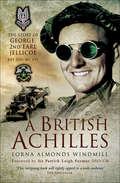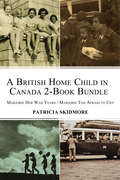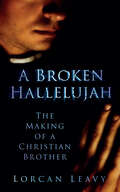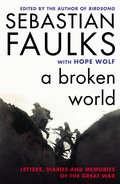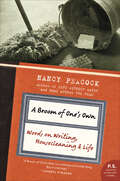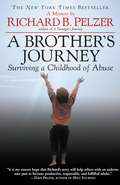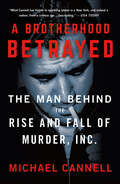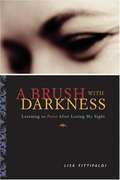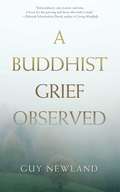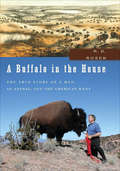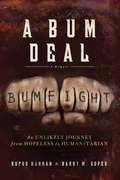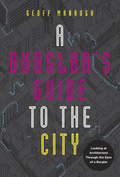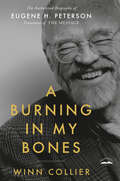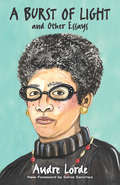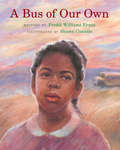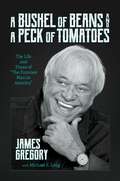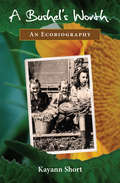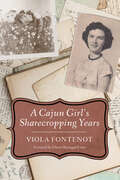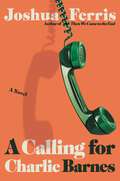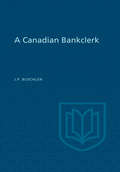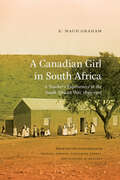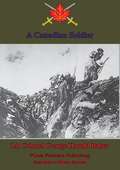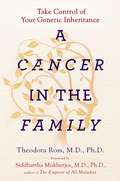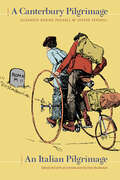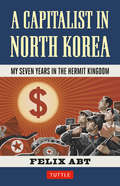- Table View
- List View
A British Achilles: The Story of George, 2nd Earl Jellicoe KBE DSO MC FRS
by Lorna Almonds Windmill&“Intriguing . . . describes a modest but exceptional man from whom the contemporary soldier, politician, and citizen can learn how to enjoy life (and how not to).&” —The Spectator Son of the victor of Jutland, George Jellicoe has enjoyed power and privilege but never shirked his duty. His war exploits are legendary and, as a founder member of Stirling&’s SAS and first commander of the Special Boat Service, he saw action a-plenty. A brigadier at twenty-six with a DSO and MC, he liberated Athens as the Germans withdrew and saved Greece from a Communist revolution. After the war, Jellicoe joined the Foreign Office and worked with spies Guy Burgess, Kim Philby, and Donald Maclean in Washington and on the Soviet Desk. His political life saw him in the Cabinet of the Heath Government and he is frank with his biographer over the issues and characters of his fellow ministers. Jellicoe&’s Achilles heel is his weakness for, and attraction to, women. His resignation over an involvement with a prostitute was a national scandal, but he is refreshingly honest and devoid of self-justification. He remained an active member of the Lords pursuing a top-level business career. A British Achilles is a superb biography of a major public figure and exemplary wartime soldier.
A British Home Child in Canada 2-Book Bundle: Marjorie Her War Years / Marjorie Too Afraid to Cry
by Patricia SkidmoreThe biography of a British girl, split from her family by the British child migration program, learning to cope with her hard new life in Canada. Marjorie Too Afraid to Cry — Book #1 In 1937, 10-year-old Marjorie Arnison was shipped from Britain to Prince of Wales Fairbridge Farm School near Victoria, British Columbia. For years she wouldn't talk about her past. It wasn't until daughter Patricia explored archival records and shared them with her mother that a home-child saga emerged. Marjorie Her War Years — Book #2 Sent away from her family and England to an isolated farm where she was at the mercy of a tyrannical “cottage mother,” Marjorie Arnison had to learn to forget her identity in order to survive in her unfamiliar and hostile new home. It was only much later in her life that the memories of where she came from began to resurface.
A Broken Hallelujah: The Making of a Christian Brother
by Lorcan LeavyA Broken Hallelujah traces a young man’s path through the Christian Brothers’ regime from Juniorate through the Leaving Certificate year to Teacher Training, and from there to work ‘on the mission’. The author describes in intimate detail the experiences and challenges he faces on the way, culminating in the final and most difficult decision of all, whether or not to remain in the fold of the Brothers’ Congregation. This unique story recalls a type of education which has long since passed out of use, and has become, for many, a piece of history in itself. In detailing his experiences, the author describes the dilemmas faced by a great number of people, dilemmas which reflect many of the choices and difficulties that have shaped the Ireland of today.
A Broken World: Letters, Diaries and Memories of the Great War
by Sebastian Faulks with Hope WolfA lieutenant writes of digging through bodies that have the consistency of Camembert cheese; a mother sends flower seeds to her son at the Front, hoping that one day someone may see them grow; a nurse tends a man back to health knowing he will be court-martialled and shot as soon as he is fit. Edited by the bestselling author of Birdsong and Dr Hope Wolf, this is an original and illuminating non-fiction anthology of writing on the First World War.Diaries, letters and memories, testaments from ordinary people whose lives were transformed, are set alongside extracts from names that have become synonymous with the war, such as Siegfried Sassoon and T.E. Lawrence. A Broken World is an original collection of personal and defining moments that offer an unprecedented insight into the Great War as it was experienced and as it was remembered.
A Broom of One's Own: Words on Writing, Housecleaning & Life (P. S. Series)
by Nancy PeacockFor the twice-published novelist, reading an article about herself in the National Enquirer—under the headline "Here's One for the Books: Cleaning Lady Is an Acclaimed Author"—was more than a shock. It was an inspiration.In A Broom of One's Own, Nancy Peacock, whose first novel was selected by the New York Times as a Notable Book of the Year, explores with warmth, wit, and candor what it means to be a writer. An encouragement to all hard-working artists, no matter how they make a living, Peacock's book provides valuable insights and advice on motivation, craft, and criticism while offering hilarious anecdotes about the houses she cleans.
A Brother's Journey: Surviving a Childhood of Abuse
by Richard PelzerThe story of Dave Pelzer is a legend of our times: the shattering tale of the child called 'It' who was forced to live in the basement. His mother was the perpetrator of the horror, but she had a willing accomplice. It was Dave's little brother Richard - the author of this book. When Dave was twelve the police removed him from the household, but the cycle of abuse continued. At the age of nine, Richard became the new 'It'.Ultimately, the only way to survive was to escape. As well as evoking the tortuous environment in which he lived, Richard B. Pelzer recounts how he managed to leave it, and how he arrived at his ultimate destination. For A Brother's Journey is a voyage of both body and spirit, one that led Richard to a place of safety, to redemption, and to reconciliation with the whipping boy who, once and again, is his brother.
A Brotherhood Betrayed: The Man Behind the Rise and Fall of Murder, Inc.
by Michael CannellThe riveting true story of the rise and fall of Murder, Inc. and the executioner-turned-informant whose mysterious death became a turning point in Mob history.In the fall of 1941, a momentous trial was underway that threatened to end the careers and lives of New York’s most brutal mob kingpins. The lead witness, Abe Reles, had been a trusted executioner for Murder, Inc., the enforcement arm of a coast-to-coast mob network known as the Commission. But the man responsible for coolly silencing hundreds of informants was about to become the most talkative snitch of all. In exchange for police protection, Reles was prepared to rat out his murderous friends, from Albert Anastasia to Bugsy Siegel—but before he could testify, his shattered body was discovered on a rooftop outside his heavily-guarded hotel room. Was it a botched escape, or punishment for betraying the loyalty of the country’s most powerful mobsters?Michael Cannell's A Brotherhood Betrayed traces the history of Murder, Inc. through Reles’ rise from street punk to murder chieftain to stool pigeon, ending with his fateful death on a Coney Island rooftop. It resurrects a time when crime became organized crime: a world of money and power, depravity and corruption, street corner ambushes and elaborately choreographed hits by wise-cracking foot soldiers with names like Buggsy Goldstein and Tick Tock Tannenbaum. For a brief moment before World War II erupted, America fixated on the delicate balance of trust and betrayal on the Brooklyn streets. This is the story of the one man who tipped the balance.
A Brush With Darkness: Learning to Paint After Losing My Sight
by Lisa FittipaldiWhen Lisa Fittipaldi went blind at the age of forty-seven, she descended into a freefall of anger and denial that lasted for two years. In this moving memoir, she paints a vivid picture of the perceptual and emotional darkness that accompanied her vision loss, and her arduous journey back into the sighted world through mastery of the principles of art and color.
A Buddhist Grief Observed
by Guy NewlandAmid the world-shattering pain of loss, what helps?"After the death of his beloved partner from cancer, Newland finds himself asking how effective his long years of Buddhist practice have been in helping him come to terms with overwhelming grief. This finely written book offers a lucid meditation on what it means to practice the Dharma when everything falls apart." --Stephen Batchelor, author of Buddhism without Beliefs and After Buddhism In the tradition of C. S. Lewis's A Grief Observed, Guy Newland offers this brave record of falling to pieces and then learning to make sense of his pain and grief within his spiritual tradition. Drawing inspiration from all corners of the Buddhist world--from Dogen and the Dalai Lama, to Pema Chödrön and ancient Pali texts--this book reverberates with honesty, kindness, and deep humanity. Newland shows us the power of responding fully and authentically to the death of a loved one. "A sad, beautiful, and necessary book--and a map waiting for many who will need it." --James Ishmael Ford, author of If You're Lucky Your Heart Will Break "Guy Newland faces squarely the pain of death and the pain of grief and offers a work of uncommon power, insight, and honesty--and extraordinary compassion." --Jay L. Garfield, author of Engaging Buddhism
A Buffalo in the House: The True Story of a Man, an Animal, and the American West
by R. D. RosenFrom a #1 New York Times–bestselling author, &“a heartwarming tale of bonding between people and animals&” (Booklist). A sprawling suburban house in Santa Fe is not the kind of home where a buffalo normally roams, but Veryl Goodnight and Roger Brooks are not your ordinary animal lovers. Over a hundred years after Veryl&’s ancestors, Charles and Mary Ann Goodnight, hand-raised two baby buffalo to help save the species from extinction, the sculptor and her husband adopt an orphaned buffalo calf of their own. Against a backdrop of the American West, A Buffalo in the House tells the story of a household situation beyond any sitcom writer&’s wildest dreams. Charlie has no idea he&’s a buffalo and Roger has no idea just how strong the bond between man and buffalo can be. In the historical shadow of the near-extermination of a majestic and misunderstood animal, Roger sets out to save just one buffalo—in a true story featuring &“one of the most memorable characters in recent nature writing&” (Publishers Weekly). &“More than a touching man-beast buddy tale . . . lovingly chronicles the history of an embattled species and its importance in the American West.&” —Entertainment Weekly &“Moving proof of the restorative powers of man&’s relationship with nature.&” —People
A Bum Deal: An Unlikely Journey from Hopeless to Humanitarian
by Rufus Hannah Barry M. SoperHannah is known to millions around the world as Rufus the Stunt Bum because of his participation in the infamous Bumfights video series. This text shares his inspirational story from his childhood in rural Georgia, his homelessness, through his recovery and rebirth with the help of Barry Soper, an ordinary man who decided not to look away.
A Burglar's Guide to the City
by Geoff ManaughEncompassing nearly 2,000 years of heists and tunnel jobs, break-ins and escapes, A Burglar's Guide to the City offers an unexpected blueprint to the criminal possibilities in the world all around us. You'll never see the city the same way again. At the core of A Burglar's Guide to the City is an unexpected and thrilling insight: how any building transforms when seen through the eyes of someone hoping to break into it. Studying architecture the way a burglar would, Geoff Manaugh takes readers through walls, down elevator shafts, into panic rooms, up to the buried vaults of banks, and out across the rooftops of an unsuspecting city. With the help of FBI Special Agents, reformed bank robbers, private security consultants, the LAPD. Air Support Division, and architects past and present, the book dissects the built environment from both sides of the law. Whether picking padlocks or climbing the walls of high-rise apartments, finding gaps in a museum's surveillance routine or discussing home invasions in ancient Rome, A Burglar's Guide to the City has the tools, the tales, and the x-ray vision you need to see architecture as nothing more than an obstacle that can be outwitted and undercut. Full of real-life heists--both spectacular and absurd--A Burglar's Guide to the City ensures that readers will never enter a bank again without imagining how to loot the vault or walk down the street without planning the perfect getaway.From the Trade Paperback edition.
A Burning in My Bones: The Authorized Biography of Eugene H. Peterson, Translator of The Message
by Winn CollierThis essential authorized biography of Eugene Peterson offers unique insights into the experiences and spiritual convictions of the iconic American pastor and beloved translator of The Message. &“In the time of a generation-wide breakdown in trust with leaders in every sphere of society, Eugene&’s quiet life of deep integrity and gospel purpose is a bright light against a dark backdrop.&”—John Mark Comer, author of The Ruthless Elimination of Hurry&“This hunger for something radical—something so true that it burned in his bones—was a constant in Eugene&’s life. His longing for God ignited a ferocity in his soul.&” Encounter the multifaceted life of one of the most influential and creative pastors of the past half century with unforgettable stories of Eugene&’s lifelong devotion to his craft and love of language, the influences and experiences that shaped his unquenchable faith, the inspiration for his decision to translate The Message, and his success and struggles as a pastor, husband, and father. Author Winn Collier was given exclusive access to Eugene and his materials for the production of this landmark work. Drawing from his friendship and expansive view of Peterson&’s life, Collier offers an intimate, beautiful, and earthy look into a remarkable life. For Eugene, the gifts of life were inexhaustible: the glint of fading light over the lake, a kiss from Jan, a good joke, a bowl of butter pecan ice cream. As you enter into his story, you&’ll find yourself doing the same—noticing how the most ordinary things shimmer with a new and unexpected beauty.
A Burst of Light: and Other Essays
by Audre Lorde Sonia Sanchez"The self-described black feminist lesbian mother poet used a mixture of prose, theory, poetry, and experience to interrogate oppressions and uplift marginalized communities. She was one of the first black feminists to target heteronormativity, and to encourage black feminists to expand their understanding of erotic pleasure. She amplified anti-oppression, even as breast cancer ravaged her ailing body." — Evette Dionne, Bustle Magazine Winner of the 1988 Before Columbus Foundation National Book Award, this path-breaking collection of essays is a clarion call to build communities that nurture our spirit. Lorde announces the need for a radical politics of intersectionality while struggling to maintain her own faith as she wages a battle against liver cancer. From reflections on her struggle with the disease to thoughts on lesbian sexuality and African-American identity in a straight white man's world, Lorde's voice remains enduringly relevant in today's political landscape. Those who practice and encourage social justice activism frequently quote her exhortation, "Caring for myself is not self-indulgence, it is self-preservation, and that is an act of political warfare." In addition to the journal entries of "A Burst of Light: Living with Cancer," this edition includes an interview, "Sadomasochism: Not About Condemnation," and three essays, "I Am Your Sister: Black Women Organizing Across Sexualities," "Apartheid U.S.A.," and "Turning the Beat Around: Lesbian Parenting 1986," as well as a new Foreword by Sonia Sanchez. "When I don't know what to do, I turn to the Lorde." — Alexis Pauline Gumbs, Bitch Media
A Bus of Our Own
by Shawn Costello Freddi Williams EvansBased on real events, this story celebrates the spirit of the African Americans who lived in rural Mississippi in the late 1940s and early 1950s. Though they paid taxes and many owned land, they received separate and unequal public services and educational opportunities.
A Bushel of Beans and a Peck of Tomatoes: The Life and Times of "The Funniest Man in America"
by James GregoryThe life story of the &“Funniest Man in America&” as only he could tell it.James Gregory is beloved by millions…but the story of his astonishing rise to success has never been told—until now.One of the most successful nightclub and theater comedians in America started out a long way from the stage, in the tiny farming community of Lithonia, Georgia. James was born into a family with lots of love but little money. His parents paid the doctor for his delivery with &“a bushel of beans and a peck of tomatoes.&”Before he became &“The Funniest Man in America,&” James was a successful salesman of everything from encyclopedias to log homes. His philosophy: take care of yourself so nobody has to take care of you. When he started over as a comedian, this commitment to hard work and honest dealing would be the key to his &“business&” of comedy. James loves working people—because that&’s what he is, too.James was quickly discovered—not just in the South, but across America—by folks who love down-home, wholesome humor. He became the court jester of country music royalty, too, from Randy Travis to &“Whispering&” Bill Anderson to the Possum himself, George Jones.Whether it&’s entertaining our troops in the Persian Gulf after 9/11, working the road with greats like Steven Wright and Jay Leno, or facing a heart-stopping emergency that sent him into a coma, James has squeezed a dozen lifetimes into a half-century of comedy. This book is the best James Gregory story yet—as only he can tell it.
A Bushel's Worth
by Kayann ShortIn this love story of land and family, Kayann Short explores her farm roots from her grandparents' North Dakota homesteads to her own Stonebridge Farm, an organic, community-supported farm on the Colorado Front Range where small-scale, local agriculture borrows lessons of the past to cultivate sustainable communities for the future."A Bushel's Worth is my favorite kind of nonfiction. Not only is it about many topics close to my heart-gardening, food, family-it is a beautifully told story, and a love story at that, centered around the love of a couple, their love for the land, and a community's love for a way of life. This book forever changed my perspective and awareness as I 'walk out' in my own garden."--Katrina Kittle, author, The Blessings of the Animals"A heartfelt meditation on farm, food, and family. A Bushel's Worth tells a love story of the land and a life spent caring for it."-Hannah Nordhaus, author, The Beekeeper's Lament: How One Man and Half a Billion Honeybees Help Feed America"Kayann Short shares a passionate and often lyrical account of how she and her husband John took their first brave steps toward revitalizing a small Colorado farm and with it their lives and the community they drew around them. This is a book about how agriculture continues to create culture when it is practiced with generosity, creativity and attention. It is an inspiring story, a gift for all of us, both on and off the farm, who are trying to learn how to slow down our frenzied lives so that we may give ourselves to what really matters."-Gregory Spaid, author, Grace: Photographs of Rural America"With a companionable mix of literary and earthy sensibilities, Kayann Short writes with graceful, ferocious attentiveness [and] finds reassurance for herself and her modern family in "the old wisdom of the fields."-John Calderazzo, author, Rising Fire: Volcanoes & Our Inner Lives"[A] beautifully written and sensually rich 'ecobiography' of farm life...A Bushel's Worth is a loving natural history - of a farm, a marriage, and a way of life that has changed interestingly and dramatically over just a few generations."-Jane Shellenberger, author, Organic Gardener's Companion: Growing Vegetables in the West"The book is a substantial meal...as much about growing community as it is about growing food, and it leaves the reader with a generous bushel of instruction and inspiration on both counts."-Susan Becker, Director, Boulder Public Library Oral History Program"A Bushel's Worth: An Ecobiography eloquently depicts humans and nature coexisting and mutually benefiting not only in theory, but in actuality...where people treat each other respectfully as they gently work on and with the land."-Shelly Eberly, National Outings Leader, Sierra Club
A Cajun Girl's Sharecropping Years
by Viola FontenotWinner of the 2019 Humanities Book of the Year from the Louisiana Endowment for the HumanitiesToday sharecropping is history, though during World War II and the Great Depression sharecropping was prevalent in Louisiana's southern parishes. Sharecroppers rented farmland and often a small house, agreeing to pay a one-third share of all profit from the sale of crops grown on the land. Sharecropping shaped Louisiana's rich cultural history, and while there have been books published about sharecropping, they share a predominately male perspective. In A Cajun Girl's Sharecropping Years, Viola Fontenot adds the female voice into the story of sharecropping.Spanning from 1937 to 1955, Fontenot describes her life as the daughter of a sharecropper in Church Point, Louisiana, including details of field work as well as the domestic arts and Cajun culture. The account begins with stories from early life, where the family lived off a gravel road near the woods without electricity, running water, or bathrooms, and a mule-drawn wagon was the only means of transportation. To gently introduce the reader to her native language, the author often includes French words along with a succinct definition. This becomes an important part of the story as Fontenot attends primary school, where she experienced prejudice for speaking French, a forbidden and punishable act. Descriptions of Fontenot's teenage years include stories of going to the boucherie; canning blackberries, figs, and pumpkins; using the wood stove to cook dinner; washing and ironing laundry; and making moss mattresses. Also included in the texts are explanations of rural Cajun holiday traditions, courting customs, leisure activities, children's games, and Saturday night house dances for family and neighbors, the fais do-do.
A Calling for Charlie Barnes
by Joshua FerrisFrom National Book Award Finalist Joshua Ferris comes a "brilliant, funny," and "heartbreaking" novel about a modern American family and a man on a secret mission to uncover the world's hidden truths—until his two lives come crashing together (Andrew Greer, author of Less). Someone is telling the story of the life of Charlie Barnes, and it doesn't appear to be going well. Too often divorced, discontent with life's compromises and in a house he hates, this lifelong schemer and eternal romantic would like out of his present circumstances and into the American dream. But when the twin calamities of the Great Recession and a cancer scare come along to compound his troubles, his dreams dwindle further, and an infinite past full of forking paths quickly tapers to a black dot.Then, against all odds, something goes right for a change: Charlie is granted a second act. With help from his storyteller son, he surveys the facts of his life and finds his true calling where he least expects it—in a sacrifice that redounds with selflessness and love—at last becoming the man his son always knew he could be.A Calling for Charlie Barnes is a profound and tender portrait of a man whose desperate need to be loved is his downfall, and a brutally funny account of how that love is ultimately earned.
A Canadian Bankclerk
by Douglas Lochhead John Preston BuschlenThe story herein told is true to life; true, the greater part of it, to my own life. Also, I am convinced that my experience in A Canadian Bank was but mildly exciting as compared with that of many others. My object in publishing "Evan Nelson's" history is to enlighten the public concerning life behind the wicket and thus pave the way for the legitimate organization of bankclerks into a fraternal association, for their financial and social (including moral) betterment. Bank officials, I trust, will see to it that my misrepresentations are exposed. To mothers of bankclerks who attach overmuch importance to the gentility of their Boy's avocation; to fathers who think that because the bank is rich its employees must necessarily become so in time; to friends who criticize the bankclerks of their acquaintance for not settling down--this story is addressed. To the men of our banks who are dissatisfied with the business they have chosen, or someone else has chosen for them; to Old Country clerks who come out to Canada under the impression that Five Dollars is as good as One Pound; to bank employees in the United States, and to office men everywhere--I am telling my tale. Finally, I appeal to "the girls we have known." Be sure you study the subject thoroughly before accusing that inscrutable, proud and procrastinating clerk of yours of inconstancy. (From the Prologue)
A Canadian Girl in South Africa: A Teacher's Experiences in the South African War, 1899–1902 (Wayfarer)
by E. Maud GrahamA Canadian woman shares her story of traveling to South Africa to teach Boer children in concentration camps following the South African War.As the South African War reached its grueling end in 1902, colonial interests at the highest levels of the British Empire hand-picked teachers from across the Commonwealth to teach the thousands of Boer children living in concentration camps. Highly educated, hard working, and often opinionated, E. Maud Graham joined the Canadian contingent of forty teachers. Her eyewitness account reveals the complexity of relations and tensions at a controversial period in the histories of both Britain and South Africa. Graham presents a lively historical travel memoir, and the editors have provided rich political and historical context to her narrative in the Introduction and generous annotations. This is a rare primary source for experts in Colonial Studies, Women’s Studies, and Canadian, South African, and British Imperial History. Readers with an interest in the South African War will be intrigued by Graham’s observations on South African society at the end of the Victorian era.“A fascinating perspective on the country. . . . Graham’s account will help others understand how the British and English-speaking Canadians in South Africa perceived Boers and native southern Africans at the turn of the twentieth century, and her descriptions reveal details about everyday life in South Africa at an important moment of transition.... Graham’s book represents the perspective of a well-embedded outsider reporting to far-removed readers, rather than that of a female teacher involved in international or imperial education.” —Benjamin Bryce, Historical Studies in Education“Recommended for those who wish to learn more about South African history and early race relations or tensions. Graham’s opinionated writing will amuse and interest those researching women’s studies.” —Amy L. Crofford, African Studies Quarterly, Volume 16
A Canadian Soldier
by Lt. Colonel George Harold Baker M.P.Lt.-Col. Baker was born into a family with a long history of service to Canada: his father had served in the Provincial Legislature or the Dominion Parliament for over forty years. Colonel Baker, a man of many interests, undertook law at McGill University and was called to the Bar in 1900. After a successful career, which included a stint as a member of Parliament, his military career started in the cavalry gazetted as a provisional lieutenant in the 6th Hussars, and by 1913 he was Lt.-Colonel of the 13th Scottish Light Dragoons. With the gathering of the clouds over Europe, Colonel Baker steeled himself for field service and responded to a toast to his health: "my aim is to win, if possible, the confidence of my men and to leave the rest to circumstance and the turn of events."His military career was to be of great merit but short in duration, like many of his comrades-in-arms who travelled from the furthest Dominions to Flanders Fields. His story is told in his collection of letters, and a copy of the despatch that memorialises his death; but suffice to say that they are a telling recollection of an upright, honourable soldier, loved by his men, conscientious to his duty, who lay down his life for his country.Author -- Lt. Colonel George Harold Baker M.P. d. 1916Text taken, whole and complete, from the edition privately published.Original Page Count - 83Illustrations -- 3 Portraits
A Cancer in the Family
by Siddhartha Mukherjee Theodora RossOncologist and cancer gene hunter Theo Ross delivers the first authoritative, go-to for people facing a genetic predisposition for cancer There are 13 million people with cancer in the United States, and it's estimated that about 1.3 million of these cases are hereditary. Yet despite advanced training in cancer genetics and years of practicing medicine, Dr. Theo Ross was never certain whether the history of cancers in her family was simple bad luck or a sign that they were carriers of a cancer-causing genetic mutation. Then she was diagnosed with melanoma, and for someone with a dark complexion, melanoma made no sense. It turned out there was a genetic factor at work. Using her own family's story, the latest science of cancer genetics, and her experience as a practicing physician, Ross shows readers how to spot the patterns of inherited cancer, how to get tested for cancer-causing genes, and what to do if you have one. With a foreword by Siddartha Mukherjee, prize winning author of The Emperor of All Maladies, this will be the first authoritative, go-to for people facing inherited cancer, this book empowers readers to face their genetic heritage without fear and to make decisions that will keep them and their families healthy.From the Hardcover edition.
A Canterbury Pilgrimage: An Italian Pilgrimage (Wayfarer)
by Joseph Pennell Elizabeth Robins PennellJourney across Europe aboard a tandem tricycle in these two Victorian-era travelogues that take readers to England and Italy.A peasant in peaked hat and blue shirt, with trousers rolled up high above his bare knees, crossed the road and silently examined the tricycle. “You have a good horse,” he then said; “it eats nothing.” —from An Italian PilgrimageThe 1880s was an exhilarating time for cycling pioneers like Elizabeth and her husband Joseph. As boneshakers and high-wheelers evolved into tandem tricycles and the safety bike, cycling grew from child’s play and extreme sport into a leisurely and, importantly, literary mode of transportation. The illustrated travel memoirs of “those Pennells” were—and still are—highly entertaining. They helped usher in the new age of leisure touring, while playfully hearkening back to famous literary journeys. In this new edition, Dave Buchanan provides rich cultural contexts surrounding the Pennells’ first two adventures. These long out-of-print travel memoirs will delight avid cyclists as well as scholars of travel literature, cycling history, women’s writing, Victorian literature, and illustration.“In the airy, self deprecating style of Robert Louis Stevenson, an American couple captured the imaginations of UK and US readers through the five illustrated cycle-travel books they created beginning in the 1880s. . . . Elizabeth and Joseph Pennell succeeded in bringing the leisure touring idea to the forefront through their jaunts aboard a tandem tricycle outfitted with luggage racks. . . . Cycling historian Dave Buchanan contributes an enlightening introduction which grounds the couple in the literary/art world of the late nineteenth century and gives a gearhead sense of bicycling history. But Elizabeth’s delightful prose steals the show.” —Foreword Reviews
A Capitalist in North Korea
by Felix AbtBusiness in North Korea: a paradoxical and fascinating situation is interpreted by a true insider.In 2002, the Swiss power company ABB appointed Felix Abt its country director for North Korea. The Swiss Entrepreneur lived and worked in North Korea for seven years, one of the few foreign businessmen there. After the experience, Abt felt compelled to write A Capitalist in North Korea to describe the multifaceted society he encountered. North Korea, at the time, was heavily sanctioned by the UN, which made it extremely difficult to do business. Yet, he discovered that it was a place where plastic surgery and South Korean TV dramas were wildly popular and where he rarely needed to walk more than a block to grab a quick hamburger. He was closely monitored, and once faced accusations of spying, yet he learned that young North Koreans are hopeful-signing up for business courses in anticipation of a brighter, more open, future. In A Capitalist in North Korea, Abt shares these and many other unusual facts and insights about one of the world's most secretive nations.mes even for weeks if an urgent project needed to be finished." According to your experience, how well do you think the North Korean people would adapt to the capitalistic system?Since the Public Distribution System largely collapsed in the crisis years of the nineties, most people have survived with a host of mostly unofficial private business activities. So they have already gone through a capitalist apprenticeship of sorts. If more reforms accompanied with institution building are carried out even more people will get used to a market economy and to responsible capitalism.In your book, you wrote: "But when people became so keen on getting a USB to watch foreign movies, I stopped offering expensive presents and gave them those tiny electronics." In North Korea, watching foreign movies is strictly banned. However, in your description, the North Korean people appear to freely enjoy foreign culture and materials. What are your thought on the censorship and government control in North Korea?Despite censorship, many people have been watching foreign movies and materials. And they liked USB as these tiny electronics, unlike CDs and DVDs, would not get stuck in a DVD-player or a computer in case of a power cut and an inspection.In your book, you mentioned how you had comparably more opportunities to meet the 'regular people' in North Korea than other foreigners. Did it seem like they actually believe the government-sponsored propaganda? Did they have faith in 'North Korean communism' or 'Juche (self-reliance)' idea? There are still a lot of people believing in North Korea's ideology. On the other hand there has been a strong trend to consumerism particularly among the emerging middle class but also among the children of the elite which would rather embrace Deng Xiaoping's credo: "To get rich is glorious!"You spent substantial amount of time in North Korea and also visited the South as well. What seems to be the major difference between the citizens? What is the task to be tackled in order to reduce the cultural gap between the countries after reunification?When I worked on joint North-South business projects (sand, mining, dairy production, mineral water production on Mount Paekdu etc.) I could feel a strong cultural gap and mistrust. Both sides felt the other side wanted to cheat them, but the misunderstandings had much to do with a lack of knowledge of the other side's thinking and motivations. I as a non-Korean saw myself in a strange position of explaining North Koreans the intentions of South Koreans and vice versa. Unfortunately, this sort of business diplomacy fostering mutual understanding and capacity building came to a complete halt when Lee Myung-bak was elected president.
